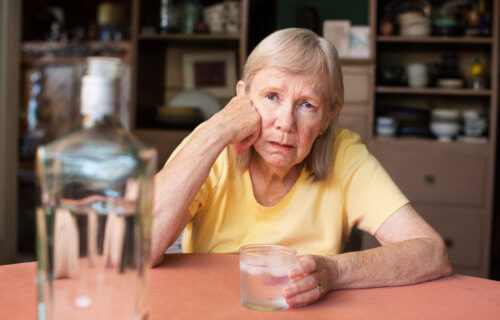ANN ARBOR, Mich. — There’s little doubt that life in quarantine was a very boring and lonely experience for many people in 2020. As Americans looked for a way to boost their mood, reduce boredom, and relieve stress, a new study finds some older adults turned more and more to alcohol as a remedy. Researchers from the University of Michigan say even “social drinkers” are showing signs of risky behavior during the coronavirus pandemic.
Their national poll of over 2,000 U.S. adults between 50 and 80 years-old examined this group’s drinking habits starting shortly before COVID and during the pandemic’s first 10 months. Results show 23 percent of older adults said they regularly have at least three alcoholic beverages in one sitting. One in 10 admit to using other substances while drinking, including marijuana and prescription medications.
Study authors note that having three or more drinks at one time and binge drinking are both signs of problematic drinking in adults of any age. Overall, only 14 percent of respondents who drink said their alcohol consumption went up during COVID. However, that number was much higher among Americans saying they drink to boost their mood or cope with pain and stress. Among this group, close to half say their drinking increased during quarantine.
Why do older adults drink?
In addition to boosting mood and lowering stress while in lockdown, researchers discovered older adults who reported being lonely over the last year also were also more likely to increase their drinking.
Troublingly, among respondents who drink, 10 percent said they reached a point during the pandemic where they believed they were drinking too much. However, few of these individuals added that they sought help for the problem.
One-third of the older Americans polled said they don’t drink alcohol. Half the poll said they mainly drink for social reasons. Perhaps because of the social distancing precautions in 2020, the survey finds these social drinkers were more likely to drink less during the pandemic. With social distancing mandates fading away in 2021, researchers say their survey points to alcohol consumption rising in the coming months.
“Even before the pandemic, heavier and more risky drinking habits were increasing in older adults at a faster rate than among younger adults,” says Anne Fernandez, Ph.D., a psychologist and assistant professor in the U-M Department of Psychiatry, in a university release.
“While not every older adult who drank more during the past year may have gone from non-risky to risky drinking, but the overall level of drinking, and the potential for interaction with other substances, is very concerning,” Fernandez adds. “As we all toast the end of the worst part of the pandemic in our country, it’s important to address or prevent problematic drinking of all kinds.”
Drinking can become a bigger issue as we age
Poll director Preeti Malani, M.D., notes that as people age, the body’s ability to process alcohol changes. For older drinkers, the same amount of alcohol they had years ago is now more likely to lead to balance issues, injuries, and even immune system decline.
“We get especially concerned when older adults are drinking multiple drinks at a sitting, so the 20% of older men who said they drink three to four alcoholic drinks on a typical day of drinking is concerning,” Dr. Malani says. “And 27% of those who drink said that at least once in the past year, they had had six or more drinks – which is a ‘binge’ level of alcohol consumption that is risky at any age, but more so as we age.”
Additionally, 27 percent of older Americans in the survey said they have been concerned about their level of drinking at some point in time. Unfortunately, only one in five sought professional help for their alcohol use.
“Heavier drinking among older adults has been on the rise for several decades. Because unhealthy alcohol behaviors become more problematic as we age, it’s important to seek treatment if you are worried about your alcohol consumption,” notes Alison Bryant, Ph.D., senior vice president of research for AARP.
